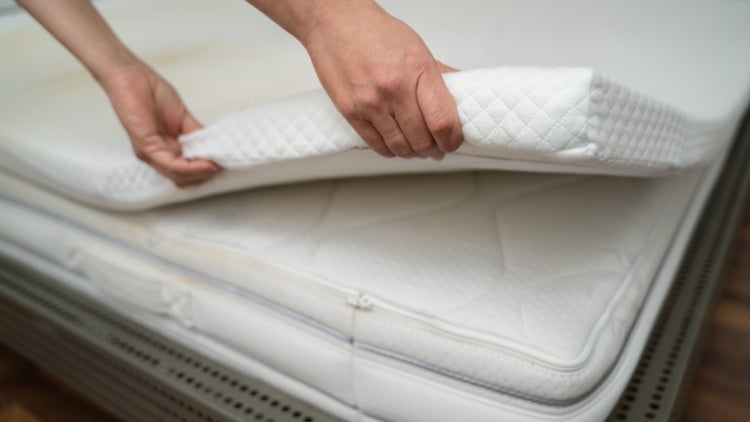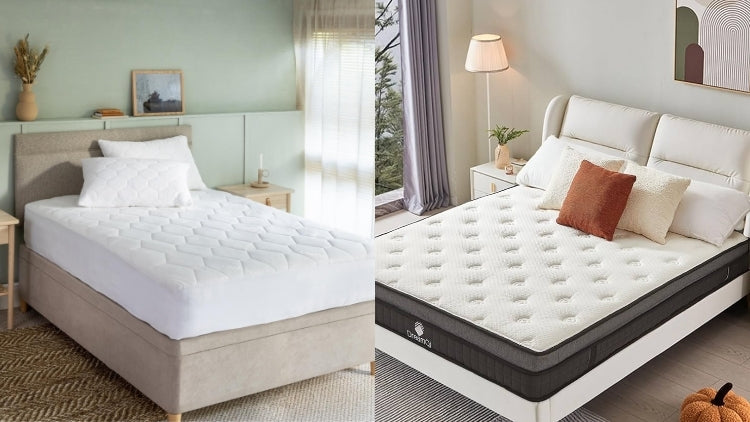Choosing the right mattress thickness is crucial for a good night's sleep. At Blissful Nights, we prioritize helping you find a mattress that caters to your individual preferences.
Whether you're a side sleeper, a stomach sleeper, or someone with particular health considerations, the thickness of your mattress can make all the difference. Let's dive into how to choose the perfect mattress thickness for you.
Understanding Mattress Thickness
The thickness of a mattress indicates its height, which is usually measured in inches. The thickness affects the comfort and support the mattress provides.
A standard mattress thickness ranges from 5 to 12 inches, but thicker mattresses can go up to 14 inches or more. Each layer in a mattress, from the base to the comfort layers, contributes to its overall thickness and performance.
Factors to Consider When Choosing Mattress Thickness
Choosing the right mattress thickness involves more than just personal preference. Considering several key factors that impact sleep quality and comfort is important.
Sleeping Position
Your sleeping position significantly impacts the type of mattress thickness you should choose. Different positions place varying pressure levels on your body, necessitating specific support and cushioning.

Whether you sleep on your back, side, stomach, or a combination, understanding how your position impacts your needs is crucial. This knowledge guides you toward the perfect mattress thickness for optimal comfort and support.
-
Stomach Sleepers
- Stomach sleepers need a supportive, firm mattress to prevent sinking and ensure proper alignment. A thinner mattress, around 6-8 inches, can offer the necessary support. This firmness helps maintain spinal alignment, reducing the risk of back pain.
-
Back Sleepers
- Back sleepers require balanced support with adequate pressure relief. A mattress with a medium thickness of 8-10 inches supports the spine and relieves lower back pressure. Multiple layers in the mattress can provide the necessary balance of comfort and support.
-
Side Sleepers
- Side sleepers benefit from a thicker mattress, around 10-12 inches, with soft top layers to cushion the hips and shoulders, providing pressure relief and comfort. The softer layers prevent the firm base from causing discomfort during sleep.
-
Combination Sleepers
- Individuals who sleep in various positions during the night should opt for an 8-10 inch thick mattress. This provides a balance of support and comfort for various sleeping positions. Medium-thickness mattresses cater to the diverse needs of combination sleepers.
Body Type and Weight
Your body type and weight are critical considerations when selecting mattress thickness. Heavier individuals typically require thicker mattresses to prevent sinking and offer enhanced support. On the other hand, lighter individuals might find medium to thinner mattresses more comfortable.
Understanding how your body interacts with the mattress helps you choose a thickness that balances support and comfort.
-
Lightweight Individuals
- Lightweight individuals can choose a mattress thickness of 8-10 inches. This provides sufficient support without feeling overly firm. Lightweight sleepers don't require very thick mattresses to feel supported.
-
Average Weight Individuals
- People of average weight should consider a mattress thickness of 10-12 inches for balanced support and cushioning. This thickness offers a good compromise between support and comfort.
-
Heavyweight Individuals
- Heavier individuals benefit from a thicker mattress, typically 12-14 inches, which offers enhanced support and prevents sinking. A thicker mattress helps distribute weight evenly and provides durable support.
Height of Your Bed Base
When selecting mattress thickness, consider the height of your bed base. For ease of access, the total height of the bed (mattress plus base) should not exceed 22 inches. This ensures that getting in and out of bed is comfortable and safe.
Material Composition
The type of material also influences the ideal mattress thickness. Memory foam mattresses must be medium to thick (10-14 inches), while latex mattresses can be thinner and supportive. Hybrid mattresses, combining coils and foam, are typically on the thicker side.
Number of People Sharing the Bed
Choosing a thicker mattress (8-10 inches) is advisable if you share your bed, as it will provide the necessary support for the extra weight. A thicker mattress ensures the bed remains stable and comfortable for multiple sleepers.
Medical Conditions
Individuals with arthritis or joint pain may find relief with a thicker, softer mattress (10-14 inches) that reduces pressure points. A medium-thickness mattress (8-12 inches) for back pain is ideal for proper spinal support. Thicker mattresses with softer top layers can help alleviate pressure points and improve comfort for those with health issues.
Age Considerations

Children are safe and comfortable on thinner mattresses. Elderly individuals might prefer firmer mattresses that are easier to move on and offer better support. Thinner mattresses are easier for kids to climb onto, and firmer mattresses provide stability for older adults.
Mattress Thickness Categories
Mattresses come in various thickness categories, each designed to meet different needs and preferences. Low-profile mattresses are suitable for children and guest beds, while thick mattresses provide extra support for side sleepers and heavier individuals. Understanding these categories helps you identify the right mattress for your specific requirements.
-
Low Profile (2-4 inches)
- These mattresses are suitable for cribs, toddlers, and temporary beds. They are easy to move and store but provide limited support.
-
Standard (5-8 inches)
- Great for most adults, providing a good balance of comfort and support. Standard mattress thickness is versatile and meets the needs of a wide range of sleepers.
-
Thick (10 inches and above)
- Thick mattresses are ideal for side sleepers, heavier individuals, and those needing extra support. They offer superior cushioning and support, enhancing sleep quality.
Mattress Thickness: The Key to Perfect Sleep
Choosing the right mattress thickness can significantly improve your sleep quality. At Blissful Nights, we offer a wide range of mattresses to suit every need. Whether you prefer a standard mattress thickness or need a thick mattress for extra support, we have the perfect option for you.
Don't compromise on your sleep quality. Visit Blissful Nights' website today to browse our selection of mattresses and find the perfect fit for your needs. Enjoy a restful night's sleep with a mattress that supports and comforts you just how you like it.Frequently Asked Questions
How does mattress thickness affect comfort and support?
Mattress thickness affects comfort and support by determining how deeply you sink into the mattress and how well it supports your body. Thicker mattresses generally offer more cushioning and support, especially for heavier individuals.
Can a thick mattress help with back pain?
Yes, a medium-thick mattress (8-12 inches) can help with back pain by providing the right balance of support and comfort, ensuring proper spinal alignment and relieving pressure.
What is the standard mattress thickness for adults?
The standard mattress thickness for adults ranges from 5 to 12 inches. Most sleepers will find that this range strikes the perfect balance between comfort and support.
Is a thicker mattress always better?
Not necessarily. The best mattress thickness depends on individual needs, such as sleeping position, body weight, and personal preferences. While thicker mattresses can offer more cushioning and support, thinner mattresses might be sufficient for lighter individuals or certain sleeping positions.
How does mattress thickness impact durability?
Thicker mattresses often have more layers and materials, which can enhance durability. A mattress's lifespan is greatly influenced by the quality of its materials and how well it is built.





Leave a comment
This site is protected by hCaptcha and the hCaptcha Privacy Policy and Terms of Service apply.